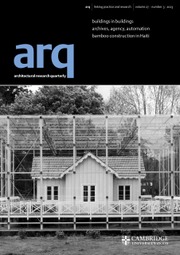Article contents
Self-identity, rationalisation and cognitive dissonance in undergraduate architectural design learning
Published online by Cambridge University Press: 19 February 2010
Extract
This theoretical paper addresses the persistence of architecture students in undergraduate design learning despite the considerable sacrifices that this frequently entails, and proposes a framework for some of the mechanisms that explain students' diligence in their love-hate relationship with the design studio. Such love-hate association is poorly understood, but is clearly a pervasive dilemma in architecture education. The proposed model includes a number of cognitive mechanisms that students may use to reconcile their idealised and romanticised self-image with the incoherent sacrifices of design studio.
- Type
- education
- Information
- Copyright
- Copyright © Cambridge University Press 2009
- 2
- Cited by




